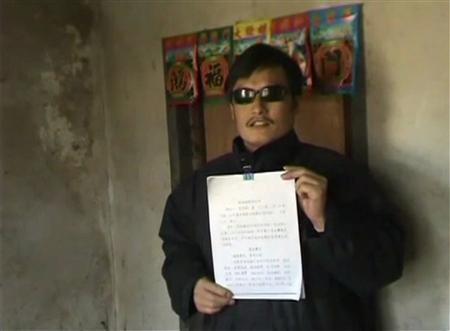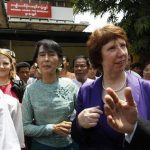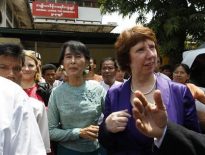By Michael Martina and Ben Blanchard
BEIJING (Reuters) – Blind legal activist Chen Guangcheng,
one of China’s most prominent human rights advocates, has escaped from home imprisonment, activists said on Friday, and
there were unconfirmed reports he had taken refuge in the U.S. Embassy in Beijing.

in eastern Shandong province, in this still image taken from file video. REUTERS/Chinaaid via Reuters TV/Handout
Chen, a self-schooled legal
advocate who campaigned against forced abortions, had been restricted to his village home in Linyi in eastern Shandong
province since September 2010 when he was released from jail.
His confinement and relentless surveillance with his
family fanned protests by Chinese sympathisers and criticism from foreign governments and activist groups.
Chen’s
reported escape and the furore it has unleashed could add to the headaches of China’s ruling Communist Party, which is
striving to ensure stability and authority before a leadership transition later this year.
It also threatened to
overshadow a visit by U.S. Secretary of State Hillary Clinton and Treasury Secretary Timothy Geithner, who are due to visit
Beijing next week for the annual “strategic and economic dialogue” between the two countries.
Hu Jia, a human rights
advocate in Beijing who has supported Chen, told Reuters he believed Chen was under U.S. diplomatic protection.
“It’s
clearly understood that his supporters took Chen Guangcheng to the safest place, and our understanding is that the safest
place means the United States Embassy,” said Hu, who was himself jailed for his outspoken criticism of the Chinese
government. “If you ask other embassies whether they have Chen Guangcheng, they will say no. But if you ask the U.S. Embassy,
they say nothing, so we believe he is there.”
The U.S. Embassy and China’s Foreign Ministry both said they had no
immediate comment.
In Washington, the State Department repeatedly declined to answer questions about Chen’s case. “I
don’t have anything for you on that subject,” State Department spokeswoman Victoria Nuland said.
Bob Fu, president of
the Texas-based religious and political rights advocacy group ChinaAid, said in a statement that Chen was in Beijing and “100
percent safe.”
In a video posted on YouTube, Chen confirmed he had escaped, and asked Premier Wen Jiabao to order an
investigation into the maltreatment of him and his family by local officials.
“It was not at all easy, but I have
escaped,” he said in the video. “Everything that was said on the Internet about the violence directed against me by Linyi,
I’m here to say that it was all true.”
Chen did not say where he was or what his plans were.
“I want Premier
Wen to open a probe into this corrupt behaviour. The money paid by the people in taxes should not be wasted by corrupt local
officials to hurt us,” he added.
While Reuters was not able to authenticate the video, there was scant doubt it was
Chen, wearing his trademark dark glasses and speaking in his halting, Shandong-accented Mandarin Chinese.
Fu said
earlier in a telephone interview that Chen’s wife, daughter and mother were still at the family’s village home, which was
surrounded by authorities after they discovered Chen had disappeared.
“The entire village and government leaders were
stunned by the developments when Chen Guangcheng was not found. So they are surrounding his home,” he said.
‘SCARED
OF REVENGE’
Another activist, He Peirong, told Reuters that Chen had talked with her.
“His spirits are OK, but
he is passing blood and is very weak,” she said. “His hands won’t stop shaking.”
She said Chen was worried about his
family.
“He is really worried about his wife, child and mother now he has escaped. He is scared the guards will take
revenge now he has escaped. The guards have beaten his old mother this year. They broke some of his wife’s bones which have
yet to heal.”
Chen’s fate has become a test of wills, pitting a crackdown on dissent against rights activists who
have rallied around his cause and that of artist Ai Weiwei.
If he is sheltering at the U.S. Embassy, it could thrust
Washington back into the limelight at a sensitive moment, recalling the case of dissident Chinese astrophysicist Fang Lizhi
who took refuge at the U.S. Embassy with his wife following the 1989 Tiananmen crackdown to the outrage of the Beijing
government. Fang eventually settled in the United States and died recently.
Officials in Shandong did not comment
immediately on Chen’s escape.
The news was widely discussed on China’s popular Twitter-like service Weibo, with
users referring to him as “the blind man” to avoid censorship of his name, reflecting his status as a Chinese cult
hero.
“He has escaped from the clutches of the devil,” wrote “Brave to speak.”
“Never has the fate of single
blind man moved the hearts of an entire nation,” added “Jing Huili.”
Phelim Kine, senior Asia researcher for Human
Rights Watch, a New York-based advocacy group, expressed concern about Chen’s health.
“If Chen has successfully
escaped, it comes not a moment too soon as there have been reports that Chen has been in extremely poor health due to severe
multiple beatings by his captors,” Kine said in an email.
Chen angered Shandong officials in 2005 by exposing a
programme of forced abortions as part of China’s one-child policy. He was formally released in September 2010 after four
years in jail on a charge of “blocking traffic.”
Chen and his wife endured a “brutal four-hour beating” by local
authorities last July, ChinaAid has said.
Last year, dozens of supporters were blocked from visiting Chen. Many of
them were beaten by men in plainclothes.
In December, Hollywood actor and “Batman” star Christian Bale was roughed up
by security guards while trying to visit Chen. Bale had been in China to promote a movie with Chinese director Zhang
Yimou.
Guo Yushan, a Beijing-based researcher who has campaigned for Chen’s release, said he believed Chen remained
free as of midday on Friday.
(Additional reporting by Chris Buckley in Beijing and Andrew Quinn in Washington; Editing
by Nick Macfie and Peter Cooney)





